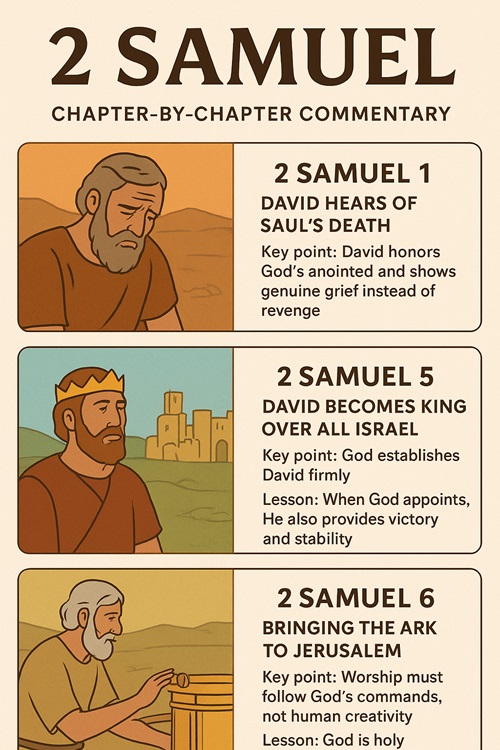1. What is the central message of 2 Samuel?
Answer:
2 Samuel: The central message is that God establishes David as the rightful king of Israel, blesses his kingdom, but also judges sin—even in His chosen king. The book shows God’s covenant faithfulness, the rise of David, the power of repentance, and the serious consequences of sin.
2. How does David become king over all Israel?
Answer:
After Saul’s death, David is first made king over Judah. Ish-Bosheth, Saul’s son, rules Israel. Eventually, Ish-Bosheth is killed, and the elders of Israel recognize David as God’s chosen king, anointing him to rule the united nation.
3. What is the significance of David capturing Jerusalem?
Answer:
Jerusalem becomes the political and spiritual capital of Israel. David unifies the tribes and brings the Ark of the Covenant there, making it the center of worship and the future site of the Temple.
4. Why did God bless David with the Davidic Covenant in 2 Samuel 7?
Answer:
David desired to build a house (temple) for God. Instead, God promises to build David a house (dynasty) forever. This covenant guarantees:
-
A permanent royal line through David
-
A future eternal king (fulfilled in Jesus Christ)
5. Why wasn’t David allowed to build the temple?
Answer:
God declares that David’s son (Solomon) will build the temple. God’s plan was for David to establish the kingdom and for Solomon—a man of peace—to construct the temple.
6. Why did Uzzah die when he touched the Ark?
Answer:
Uzzah touched the Ark to steady it, but God had commanded that only Levites carry the Ark on poles, never on a cart. His action violated God’s holiness, teaching Israel reverence for God’s presence.
7. What was David’s greatest moral failure in 2 Samuel?
Answer:
His sin with Bathsheba and the arranged murder of Uriah. This event becomes the turning point of his reign and introduces a series of troubles in his family and kingdom.
8. How did God respond to David’s sin with Bathsheba?
Answer:
God forgave David when he repented, but still announced consequences:
-
The child born to Bathsheba dies
-
Violence rises in David’s house
-
David’s wives are publicly dishonored
-
The sword never departs from his family
9. Why did God still call David “a man after His own heart”?
Answer:
Not because David was sinless, but because:
-
He sincerely repented
-
He desired to obey God
-
He worshipped wholeheartedly
-
He trusted God deeply
David’s heart attitude distinguished him from Saul.
10. Who was Absalom, and why did he rebel against David?
Answer:
Absalom was David’s son. His rebellion arose from:
-
Anger due to David’s failure to punish Amnon
-
His own ambition and pride
-
Attempt to seize the throne
His revolt leads to a civil war in Israel.
11. Why did David weep for Absalom even though Absalom rebelled?
Answer:
Because Absalom was still his son. David’s grief (2 Samuel 18:33) shows his:
-
Fatherly love
-
Regret for family brokenness caused by his own sins
-
Understanding of the high cost of rebellion
12. What was the purpose of the famine in David’s time?
Answer:
The famine (2 Samuel 21) was God’s judgment for Saul’s past sin of killing the Gibeonites, violating Israel’s oath. David sought God, then made restitution, restoring justice.
13. Why did David insist on paying for Araunah’s threshing floor?
Answer:
David said, “I will not offer to the Lord my God burnt offerings that cost me nothing.”
This expresses:
-
True worship involves sacrifice
-
A heart fully devoted to God
The site became the future location of Solomon’s Temple.
14. How does 2 Samuel point forward to Jesus Christ?
Answer:
Jesus is:
-
The promised Son of David
-
The eternal king of the Davidic dynasty
-
The perfect and sinless ruler
-
The fulfillment of the Davidic Covenant
2 Samuel prepares the way for the Messiah.
15. What are the main themes of 2 Samuel?
Answer:
-
God’s covenant faithfulness
-
The rise and rule of David
-
The seriousness of sin and its consequences
-
God’s mercy and forgiveness
-
Leadership, repentance, and restoration
